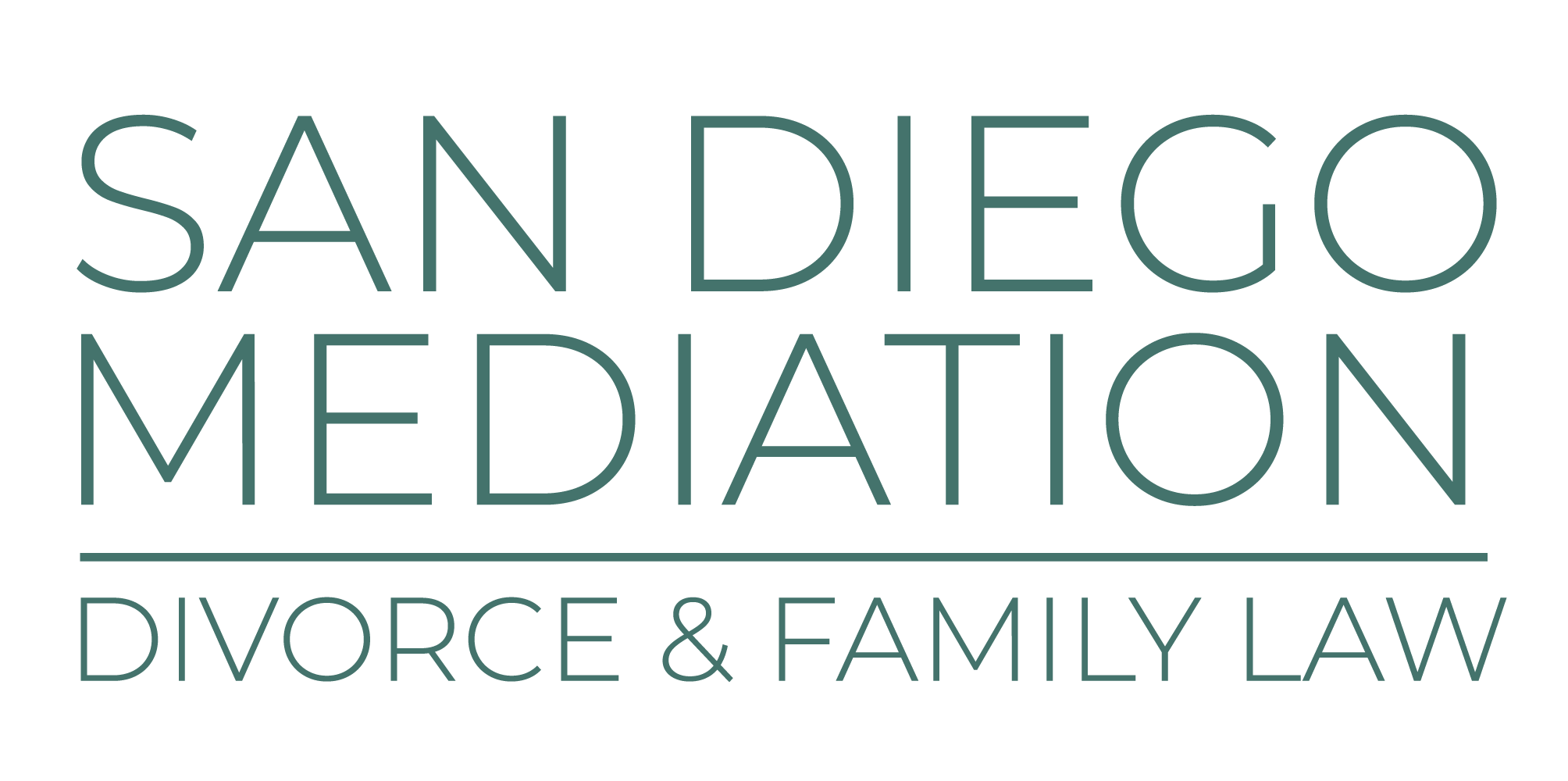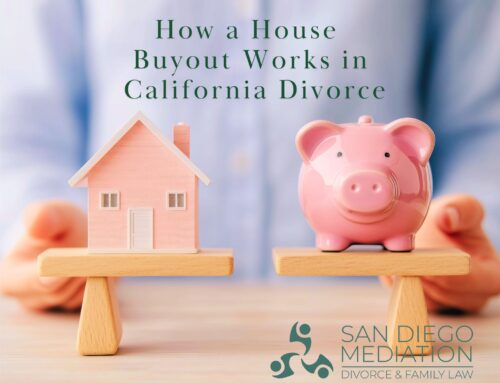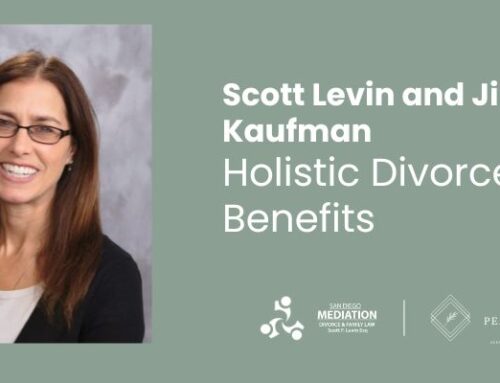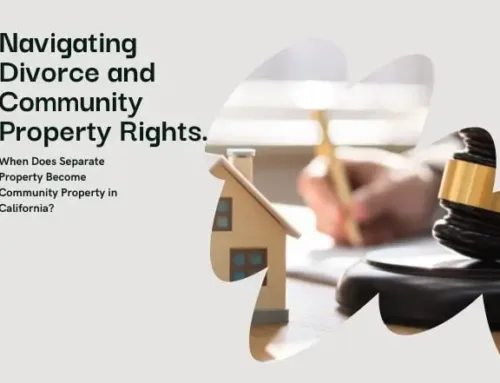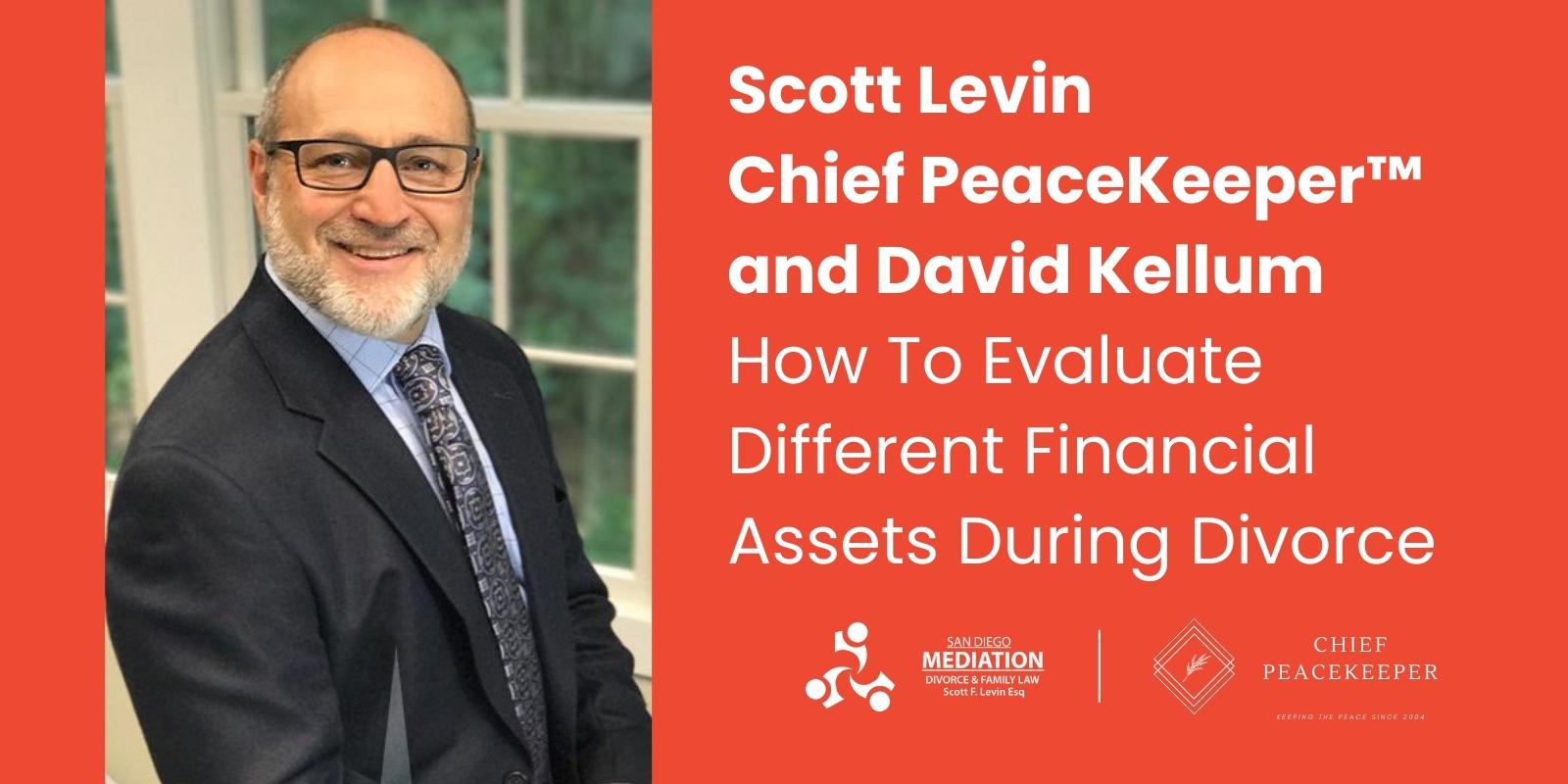
EvaluatING Financial Assets During Divorce Mediation
Chief PeaceKeeper™ CDFA attorney Scott Levin and renowned attorney mediator, David Kellem, sit down to discuss the importance of making strategic financial business decisions during your divorce.
Chief PeaceKeeper™ Scott Levin 0:02
Hey everybody, this is Scott Levin chief peacekeeper™ and I’m here with my good friend David. Callum, how are you, David? Doing great, Scott, always fun to see you. Yes. So David and I have spoken before on our recordings. And I want to remind everyone that David has a really cool feature to his website on his blog. It’s called David’s divorce dictionary. And, you know, I’ve been in this industry nearly 20 years, I guess, not 16 years. So don’t want to exaggerate. But you know, that his site is so cool. And there are so many great stories and tidbits there. So I want to encourage everyone to go to it. And David playing off of your divorce dictionary, one of the articles there is called business decisions for bi pursue. Yeah, Bs for business decision, that is correct. And so in that article, you speak to something that is really in every case occurrence for me, which is house poor, sorry, house rich, and cash poor. And so it’s very common. And some of the viewers, you know, if you’re starting the divorce process, you know, especially when you have kids, you know, minor children, kids that are still around the house, that one of the parties, you know, wants to hold on to the house. But what David’s gonna speak to today is really, you have to be really thorough in your analysis of whether you can really afford the house and David, maybe you could kind of take it from there. And we’ll, we’ll talk it through.
David Kellum, Attorney-Mediator 1:36
Yeah, I’d be happy to Scott. So the idea of business decisions in divorce is the idea of making decisions about your future financial life, not from the standpoint of emotion, but from the standpoint of really almost an accounting analysis. And, you know, the, the trick is with the house, almost, in every case, one of the spouses, if not both of them are really emotionally attached to it. Sometimes we, you know, it’s it’s the house with which children are raised. And so many great family memories reside. And sometimes it’s because the house was physically built by one of the spouses and they have so much sweat equity into it. And they really, really attached to it. So when I am when a mediating, and one of the spouses, wants to keep the house and that spouse is not wealthy, I always caution them to make a business decision about that. So what does that mean? What that means is that when deciding whether to keep a house, you have to not just look at whether it’ll feel like a home to you, but whether it’s going to put you out on the street, so to speak, because you can’t afford it. And many people, if not most people don’t ever really analyze that. So what we do is we ask the clients to really break down the costs, and think about them, put them on a piece of paper, or on a spreadsheet, if possible. And those costs are they’re always almost always the same. There it’s the mortgage cost. And it but it’s the mortgage class after you complete a buyout if that has to happen. So sometimes to keep a house you have to increase your mortgage, to get cash to pay the other person. So you have to know what that new mortgage amount is going to be. So that’s only part one. Part two is understanding what the taxes the property taxes on the house cost. Now, they may be built into the mortgage, and you might have already thought about that. But the taxes can go up every year. And so your mortgage can go up every year because of tax increases. And the same is true for insurance on the house. So you have to be aware of that piece. The next part is the utilities Of course. And some people know what the utilities are and some people don’t. But then there’s the real secret sauce to this. And that is the maintenance expenses and the upkeep. A lot of people defer their maintenance on a house. You know, they don’t keep up with it. So some I’ve seen clients come in to keep a house and then a year after the divorce, they find they have to replace the roof 789 $1,000 and they don’t have that money or the plumbing in a bathroom blows up. That actually happened in my own house when I just bought it and fortunately I had a little set aside for it. But it’s because I was I thought ahead, but these things happen and they can cost easily $5,000 a year you can easily spend about $5,000 a year on a regular two-bedroom, three-bedroom house for maintenance, but people don’t often plan for it and they don’t build it in and So then there are other costs, um, you know, there’s the everyday upkeep, just replacing the light bulbs, you know, keeping it clean, you know, if you’re too busy too between work and kids, and you need a housekeeper, well, there’s a could be a couple of $100 a month more, too. So you’re building all these costs, and really understanding how much maintenance especially your house is going to need is really important. And what I’ve often found is that people that plan to keep the house, when we actually figure out how much it’s going to cost them on a monthly basis over time. And then we look at what their income level is, including any support they either receive or pay. A lot of times they realize they really can’t afford it. You know, so a house Yeah, like a house that has, let’s say, a $3,000 a month mortgage, might really cost you $5,000, a month or more. And so, you know, it’s a hard reality, it’s a very disappointing reality for a lot of people. But I think as a mediator, as a lawyer, if we don’t make our clients really look at that, if we don’t require them and help them make that business decision, they’re going to be really, really destroyed a year later.
Chief PeaceKeeper™ Scott Levin 6:21
Yeah, and I really like how you explained it. So I mean, one thing that David was explaining was that, let’s say I have $100,000 in equity, at the time of my divorce, and we own the house 5050. So I owe my soon-to-be ex-wife, $50,000 because that’s her percentage of that equity. So now, my mortgage payment was, you know, 15 $100 a month, but I’m going to have to eat, I’m going to have to take a loan out in order to pay her that $50,000 because I don’t have it sitting around in the bank. So my loan is going to go up, there’s also going to be 234 1000 $5,000 in closing costs that I’m going to incur. And so the new loan amount is going to be higher than that 15 $100 a month that I was paying. And in Southern California, in particular, I just got my renewal notice from State Farm for my homeowner’s policy. Yeah, it’s gone up almost 50%, because of the fires that have been happening throughout Southern California. So it jumped from what I already thought was expensive, to 50% higher, and then my great agent who I love, who doesn’t want to lose me warn me that, well, this isn’t really the increase, the increase is what you can expect to get next year, because of the fires. So they’re obviously being told to warn their clients, that this is just the teaser. So I mean, these expenses is three, especially in high, you know, inexpensive areas, like you know, all throughout California really anywhere in this country at this point, you know, that expenses aren’t going to be less than what they are today, a year from now, and so on and so forth. So what David is speaking to, is taking the emotion out and be for business decision, putting on your big hat, putting your brain to work and pen to paper, and really trying to figure out if you can afford it comfortably because Don’t forget, as we know, David, there’s, you know, extra kids extracurricular activities, tutoring, college prep, bar mitzvahs, you know, skin to the arrows, you know, all these things that are gonna be coming up as well. What about food on the table?
David Kellum, Attorney-Mediator 8:45
My favorite is when you’re when the youngest child gets their driver’s license, your automobile insurance goes up by over $2,000 right away. Yeah. You know, I mean, there’s another, you know, surprise that you need to plan for a date. Yeah, sorry. Go ahead. Yeah, what I was gonna say you’re the other thing about the business decision is you’re What does every business need, it needs cash flow, right, it’s got to pay its bills. And when you’re divorced, and you’re running your household, you’re running a little mini business, right? And so here’s the problem. When someone is so committed to keeping the house that they keep the house and they have all this equity, let’s say the house is worth $500,000 but that’s all they have there was because there isn’t enough cash in the marriage. For some for the person to keep both the equity in the house of 500 and receive any other liquid assets. They may have, you know, be sitting on a pile of money with the house but they can’t spend it and they can’t draw around it to pay their bills to pay for the kids to pay for the Kingston era. You know to grant gifts for Christmas and Hanukkah in the holidays. So you can be house rich, you can be wealthy by virtue of the value of your house, but you can be cash poor and not end up having an operating business basically.
Chief PeaceKeeper™ Scott Levin 10:10
Well, I want everyone to go check out David’s website, David reminded us of your website address.
David Kellum, Attorney-Mediator 10:15
Yes, it’s www kellem law group.com. Or if you google David’s divorce dictionary, you’ll find it there too. Alright guys, thanks so much. We’ll talk to you soon. Thank you, Scott.
Transcribed by https://otter.ai
